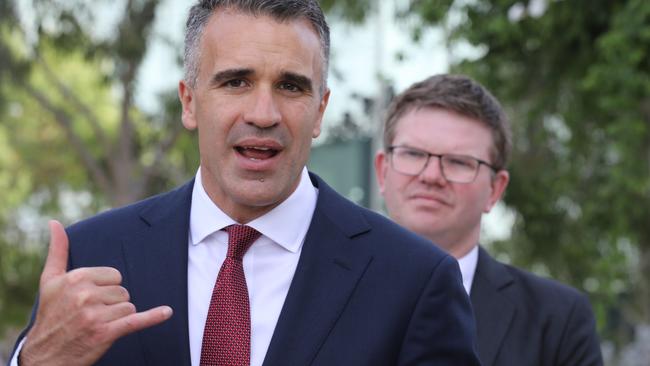Michael McGuire: Labor has been convinced for a while the stadium was toxic
Labor made an early splash when it muscled in front of the cameras from the campaign outset as the party’s frontman raced to dump old baggage, writes Michael McGuire.
Opinion
Don't miss out on the headlines from Opinion. Followed categories will be added to My News.
Labor has run a highly traditional election campaign.
One straight from the “Election campaigning for dummies’’ playbook. It started with a big launch with lots of colour and movement. A happy leader, smiling with his family. A nice, big shiny experience all around.
From there it was just a race to spend as much money as was possible, without being seen to entirely bankrupt the state.
Coming into the election, Labor was faced with two pressing issues. One was that its leader Peter Malinauskas was not well known in the broader electorate.
Because Covid had dominated the environment for more than two years, the role of the Opposition leader was naturally pushed into the background.
Unlike other opposition leaders around the country, Malinauskas took the decision to back Steven Marshall’s government in its handling of the pandemic, at least until the last six months.
But that decision naturally condemned him to a period of irrelevancy.

Made worse by the general view for the first two years that the Marshall government, along with chief public health officer Nicola Spurrier and Police Commissioner Grant Stevens, had done an excellent job and SA had done better than just about anywhere else in the world in handling the pandemic.
That’s why the airwaves were saturated early on with ads of Malinauskas telling voters who he is.
The second big challenge was to try to perform a magic trick and make the last four years of the previous Labor government disappear.
The last Labor government lasted 16 years, but the final term, under premier Jay Weatherill, was easily its worst. It was not a good government.
The headlines everyone remembers from the Weatherill years were skyrocketing energy and water prices, the disasters of Oakden and Transforming Health and abject failures in child protection.
Malinauskas had been a cabinet minister at the tail end of that government and, worse, had been Health Minister right at the end. He knew in the election campaign he would be carrying the can for Labor’s decision to close the Repat.
He had helped prepare for the inevitable for apologising to anyone who would listen for a couple of years for the Repat decision, which was taken before he was in parliament.


The bet was voters would be so astounded by the novelty of a politician actually apologising and admitting error that it would make up for the bad memories.
Then they went on the attack on health.
Labor seized on worsening ramping stats, which were at least partly a hangover from their own mismanagement, and framed the whole election as being about health.
That takes some chutzpah but it worked and the vast bulk of the campaign has been fought on Labor’s terms.
Even better, from Labor’s point of view, was Marshall’s decision to stick with the $662 million Riverbank arena, which Labor derided as a “basketball stadium’’. Labor has been convinced for a while the stadium was toxic. Indeed they took a decision to go quiet for a while on criticising it, for fear it would be dumped.
Labor won at least three of the four weeks of the campaign with a disciplined, relentless performance.




